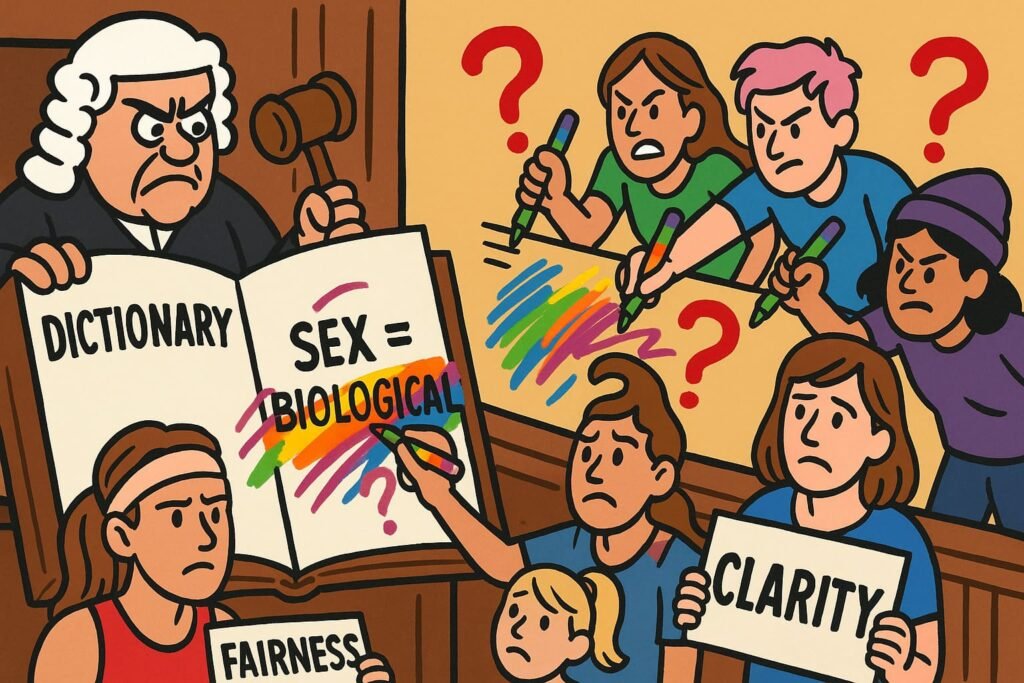Sex in Law Explained – The Case for Biological Clarity
From Common Sense to Controversy
Once upon a time, the word sex in law meant one thing: male or female, based on biology. Simple, obvious, uncontroversial. Today, it’s anything but. Activists, academics, and policymakers have blurred the lines between biological sex and self-declared gender identity. The result is confusion in sports, schools, prisons, healthcare, and the courts.
What was once a clear foundation of rights has become a battlefield of definitions.
Table of contents
What Is “Sex in Law”?
In legal frameworks, sex traditionally refers to biological reality: chromosomes, reproductive systems, and physical characteristics. This definition underpinned:
- Equality law – protecting women from discrimination.
- Privacy rights – in bathrooms, changing rooms, and prisons.
- Sports fairness – ensuring women’s categories weren’t dominated by men.
For centuries, this clarity helped establish women’s rights, protect children, and provide stability in law.
But in recent decades, activists have pushed to replace biological sex with gender identity — a self-declared category detached from biology.
The Confusion Around Definitions
The shift has led to legal grey zones:
- In schools – children are taught sex is “assigned at birth” rather than biological.
- In sports – governing bodies debate whether self-identified women can compete in female leagues.
- In prisons – biological males identifying as women are housed with female inmates, with obvious risks.
- In healthcare – data collection on sex is being muddied by gender categories, undermining medical accuracy.
What was once clear-cut is now contested. And the confusion isn’t accidental.
Why Biological Sex Matters
The legal definition of sex matters because it underpins fundamental protections:
- Women’s rights – Without biological sex, the category “woman” loses meaning, and female-only spaces lose protection.
- Child safeguarding – Kids need stability and clarity, not ideological experiments about identity.
- Gay rights – If sex is redefined as “identity,” even the concept of same-sex attraction collapses.
- Fairness in sport – Physical advantages of male biology don’t vanish with self-identification.
Without clarity, the entire legal framework built on sex risks collapse.
How Activists Redefine It
Activist frameworks, drawn from Queer Theory and Trans Studies, deliberately reject biology. Their argument:
- Sex is “assigned” at birth, not real.
- Gender identity is the “true” self, regardless of biology.
- Refusing to accept this is labelled “bigotry.”
The tactic is simple: replace objective terms with subjective ones, then demand the law adapt. This isn’t progress — it’s semantic sleight of hand.
Real-World Consequences
The consequences aren’t theoretical — they’re already visible:
- Sports – Female athletes lose scholarships and medals to biological males.
- Education – Children are exposed to confusing identity ideology, often without parental consent.
- Prisons – Violent male offenders transferred into women’s facilities.
- Healthcare – Sex-based data muddled, undermining diagnoses and treatments.
- Public trust – People see institutions prioritising ideology over reality.
When sex loses its meaning, law loses its grip on fairness.
Who Benefits From the Confusion?
Confusion isn’t neutral — it creates winners and losers.
- Activists – Gain permanent campaigns and funding.
- Corporations – Wrap themselves in rainbow logos while dodging bigger issues like wages and taxes.
- Politicians – Score easy “progressive” points without addressing housing, healthcare, or inequality.
And who loses? Ordinary women, children, gay people, and anyone who values clarity in law.
Why It Matters
The definition of sex isn’t a side issue — it’s foundational. If sex is blurred into identity, entire legal protections unravel.
The fight over words isn’t about kindness — it’s about power. By redefining sex, activists don’t just rewrite dictionaries; they rewrite law, rights, and society itself.
Back to Clarity
Sex used to be a matter of biology. Clear, stable, objective. Today, ideology has turned it into a moving target. But a society cannot function when its most basic categories are unstable.
Clarifying that sex in law means biological sex isn’t exclusionary. It’s the foundation for women’s rights, children’s safeguarding, and legal coherence.
Without this clarity, rights dissolve into confusion — and confusion is always exploited by those in power.
→ Link to Women’s Rights (law underpinning rights), Fairness in Sport (application in sports), Women’s Spaces (application in safety), Feminism (historical frame).
Visit our Women & Biology Explainer Hub to see how law, sport, rights, and safeguarding all collide with ideology.
FAQ: Sex in Law
What does “sex” mean in law?
Traditionally, it meant biological male or female. Today, activists push to replace this with gender identity.
Why does biological sex matter legally?
Because women’s rights, child safeguarding, sports fairness, and even gay rights depend on it.
Isn’t gender identity more important than biology?
Identity may matter socially, but law requires objective, stable categories. Biology provides that; self-declaration does not.
Who benefits from redefining sex?
Activists, corporations, and politicians who gain power or branding points from confusion.
What’s the danger if sex isn’t clarified?
Women lose protections, children lose clarity, and law loses coherence.



